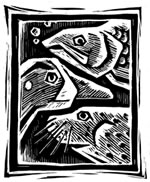- Home
- Restoration Projects
- Project Search
- Injury to Pink Salmon Eggs and Pre-Emergent Fry Incubated in Oiled Gravel 94191-1
Project Information
Title: Injury to Pink Salmon Eggs and Pre-Emergent Fry Incubated in Oiled Gravel 94191-1
Project Year and Number: 1994: 94191-1
Other Fiscal Years and Numbers for this Project: 1999: 99191-A-CLO, 1998: 98191-A1, 1997: 97191-A, 1997: 97191-A2, 1997: 97191-A1, 1996: 96191-B, 1996: 96191-A, 1996: 96191-A1, 1995: 95191-A, 1995: 95191, 1995: 95191-B, 1995: 95191-A1, 1995: 95191-A2, 1994: 94191-2, 1993: 93003, 1992: FS02, 1991: FS02, 1990: FS02, 1989: FS02
Principal Investigator (PI): Jeep Rice (NOAA )
Managing Agency: NOAA
Assisting Personnel: Ron Heintz, Jeff Short
Research Location: Prince William Sound
Restoration Category: Research
Injured Resources Addressed: Pink Salmon
Abstract: Following the EVOS, elevated embryo mortalities were detected in populations of pink salmon inhabiting oiled streams in the Prince William Sound (PWS) area. Increased mortality rates have persisted three years after the EVOS, suggesting that genetic damage may have occurred, resulting in reduced reproductive capacity. A persistent decline of the wild pink salmon stocks could render present restoration efforts inadequate. This study will continue to monitor the recovery of pink salmon embryos and fry in the field, provide laboratory verification of field results, and test the hypothesis that exposure of pink salmon to a polluted incubation habitat will result in the functional sterilization of these animals at sexual maturity. The streams examined during the post-EVOS Natural Resource Damage Assessment will be used to sample egg deposition, pre-emergent fry, eggs, and fry. A laboratory will be used to expose fertilized eggs to oil in an environment mimicking actual environmental conditions. Embryos and fry from both the field and the laboratory will be examined for the presence of genetic aberrations.Proposal: Not Available
Reports:
Annual Report FY94: View (4,421 KB)
Final Report: See Project 98191-A1
Publications from this Project: None Available
